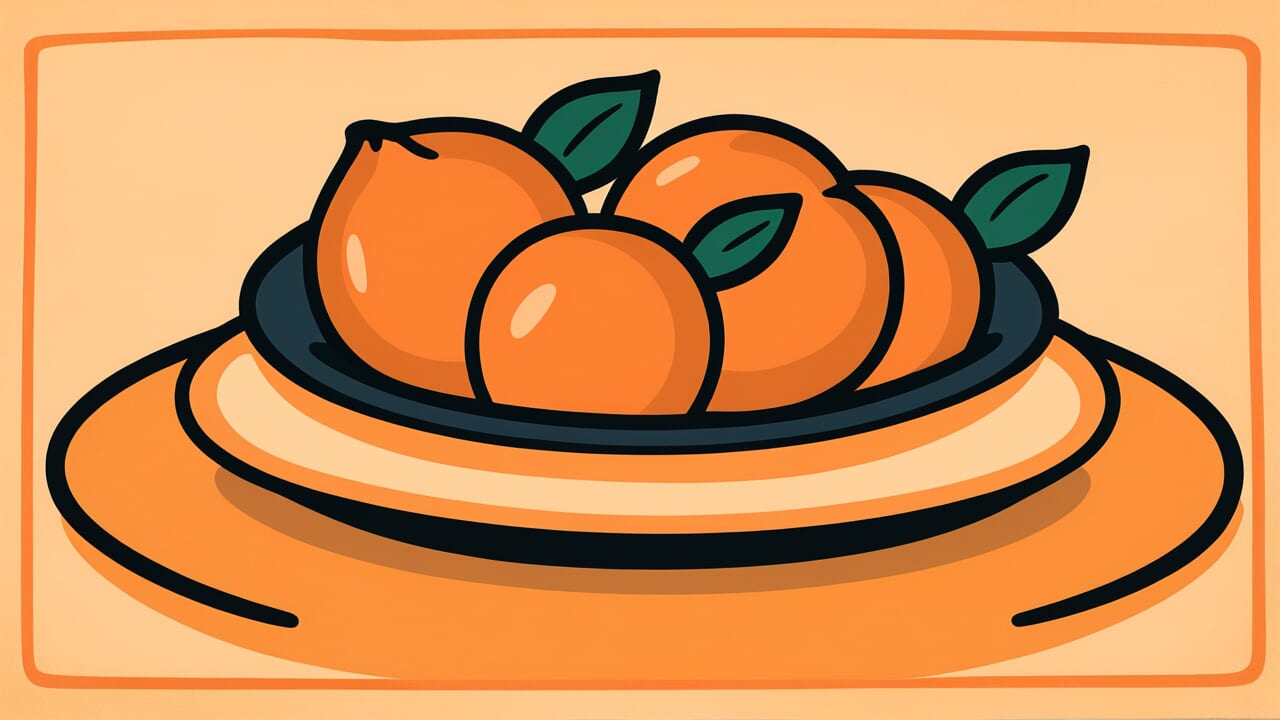How to Read “Arrange peaches on a plate”
Sara ni momo wo moru
Meaning of “Arrange peaches on a plate”
“Arrange peaches on a plate” is a proverb that describes an unstable state where someone cannot settle down. When you try to place round peaches on a flat plate, they roll around and won’t stay still.
This physical instability represents someone who is restless and fidgety. It also describes situations where things keep shifting and won’t settle into place.
This proverb is especially used when someone’s attitude or mental state is unsettled. It describes people who can’t stay in one place. It also applies to those who can’t make decisions and keep wavering.
It captures the state of being unable to concentrate because your mind keeps wandering. Just like peaches rolling on a plate, your mind or body won’t settle down.
Even today, this phrase works as an accurate metaphor for restlessness and instability.
Origin and Etymology
No clear historical records explain the origin of this proverb. However, we can make interesting observations from the words themselves.
The key is the combination of “plate” and “peaches.” A plate is flat and stable, but peaches are round fruits. When you place round peaches on a flat plate, they naturally roll easily and won’t stay arranged.
This physical instability forms the core of the proverb’s meaning.
Since ancient times, Japanese culture has valued beautiful food presentation. Peaches were especially treated as noble fruits. People wanted to arrange them carefully when serving guests.
But trying to arrange round peaches on a flat plate inevitably creates instability. This everyday difficulty became a metaphor for restless behavior.
The choice of peaches likely relates to more than just their shape. Their juiciness and softness also matter. Hard fruits can roll without much problem.
But soft peaches bruise easily when they roll, requiring extra care. This tension perfectly expresses an unsettled psychological state.
Usage Examples
- The new employee is fidgeting like arranging peaches on a plate, clearly not adjusted to the workplace yet
- Before the interview, I was as restless as arranging peaches on a plate, standing up from my seat in the waiting room repeatedly
Universal Wisdom
The proverb “Arrange peaches on a plate” reveals a fundamental truth. There is always tension between our desire for stability and the reality of instability.
We all want mental stability. We wish to stay calm and composed. But life inevitably brings unstable periods.
When we enter new environments, face big decisions, or encounter unknown situations, our hearts naturally waver.
This proverb has endured because it teaches an important lesson. Restlessness is not something to be ashamed of. It’s a natural human state.
When you try to arrange round peaches on a flat plate, instability is inevitable. The peaches aren’t bad. The plate isn’t bad either. It’s just the nature of that combination.
Similarly, when people feel unsettled in new situations, it’s not weakness. It’s a natural human response. Our ancestors didn’t blame this instability.
Instead, they acknowledged it and put it into words. By sharing this expression, they helped people understand each other’s inner turmoil. This compassionate understanding of human nature is the deep wisdom contained in this proverb.
When AI Hears This
From an information transmission perspective, arranging peaches on a plate reveals a surprisingly calculated strategy. A peach alone only conveys “delicious-looking fruit.”
But the moment you place it on a white porcelain plate, the information explodes. Why? Because the plate, something “deliberately prepared,” makes the sender’s intention visible.
In information theory, signal value depends on contrast with noise. A peach rolling on a desk gets buried in the noise of “just happens to be there.” But a peach arranged on a plate becomes a clear signal: “prepared for you.”
Adding the seemingly redundant element of a plate actually increases information purity. This appears wasteful but follows the same principle as error correction codes in communication engineering.
Even more interesting is how plate quality functions as a secondary information channel. A cheap plate conveys “just the thought.” An expensive plate transmits “economic comfort and aesthetic sense.”
This means one action multiplexes multiple layers of information. Modern luxury brand packaging being more elaborate than the product itself follows exactly this principle.
The plate, as a classical interface, is a refined signaling device that transmits maximum information at minimum cost.
Lessons for Today
This proverb teaches modern people the courage to accept unstable states. We constantly seek stability and tend to blame ourselves for feeling unsettled.
But life inevitably brings periods of “arranging peaches on a plate.” Job changes, moving, new relationships, life transitions. During such times, an unsettled mind is completely natural.
What matters is not denying that instability but recognizing it as temporary. Round peaches rolling on a flat plate isn’t because the peaches are badly shaped. They simply haven’t found the right position yet.
Your wavering heart doesn’t mean you’re weak. It’s evidence that you’re adapting to a new environment.
Modern society demands constant composure. But precisely because we live in rapidly changing times, we need the mental space to tolerate temporary instability.
Don’t rush. Give your heart time to adjust to its new place. Eventually the peaches will stop rolling, and your heart will find new stability.



Comments